When Diplomat Families Witness or Experience Traumatic Events
Sahana Kanabar and Tanya Crossman
TCK Training’s 2021 survey on childhood trauma in globally mobile Third Culture Kids collected data from 1,904 Adult Third Culture Kids who experienced global mobility. While the initial data analysis focused on Adverse Childhood Experiences (published in our white papers Caution and Hope and TCKs at Risk) our latest white paper Sources of Trauma in International Childhoods: Providing Individualized Support to Increase Positive Outcomes for Higher Risk Families looks at potentially traumatic experiences occurring in the community. This article is part of a series of blog posts that looks a little deeper at certain sub-groups represented in the data.
When Diplomat Families Witness or Experience Traumatic Events
Part of TCK Training’s research on the well-being of Third Culture Kids (TCKs) looked at potential sources of trauma which might impact children. 107 diplomat kids took part in our 2021 survey We learned some difficult truths through this research, including that 1 in 4 diplomat kids experienced a home invasion, and half were impacted by a family medical crisis.
In this blog post, we go through data from our white paper “Sources of Trauma in International Childhoods: Providing Individualized Support to Increase Positive Outcomes for Higher Risk Families” that applies specifically to diplomat kids. We hope to see this research used to support the well-being of foreign service kids globally – before, during, and after their time abroad.
In this blog post, we go through data from our white paper “Sources of Trauma in International Childhoods: Providing Individualized Support to Increase Positive Outcomes for Higher Risk Families” that applies specifically to diplomat kids. We hope to see this research used to support the well-being of foreign service kids globally – before, during, and after their time abroad.
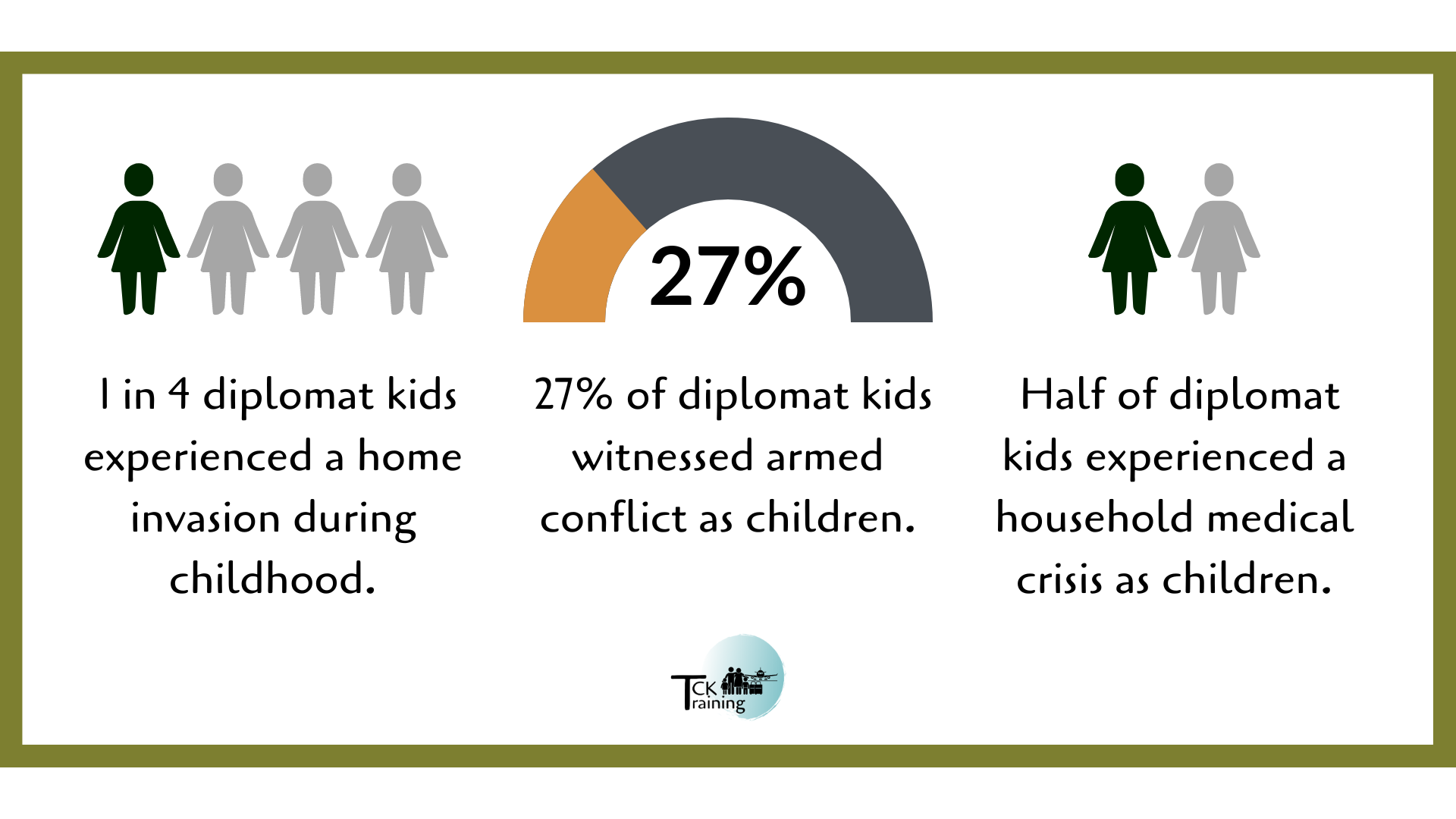
What is a traumatic event?
‘Trauma’ describes an event that produces harm for an individual with lasting effects. ‘Big T’ trauma describes life-threatening situations including violence and disaster. ‘Little t’ trauma does not necessarily involve threat of physical harm, but describes situations that create mental and emotional distress. All types of trauma can negatively impact mental and physical health throughout life, increase risk-taking behaviors and suicidal ideation, and harm relationships. Traumatic childhood experiences that go unrecognized and unprocessed can cause these problems later in life.
In this blog post, we discuss three categories of potentially traumatic events. These are events likely to cause either a ‘Big T’ or ‘little t’ trauma impact on the individual. In the “Sources of Trauma” white paper we discuss a research framework behind why such events can be traumatic, and how they can impact young people long term.
In this blog post, we discuss three categories of potentially traumatic events. These are events likely to cause either a ‘Big T’ or ‘little t’ trauma impact on the individual. In the “Sources of Trauma” white paper we discuss a research framework behind why such events can be traumatic, and how they can impact young people long term.
- Small-scale events: localized to the household or local community
- Large-scale events: affect a wide area or large community as well as having personal impact
- Witnessed events: when an individual sees something without necessarily being personally involved
Small Scale Events
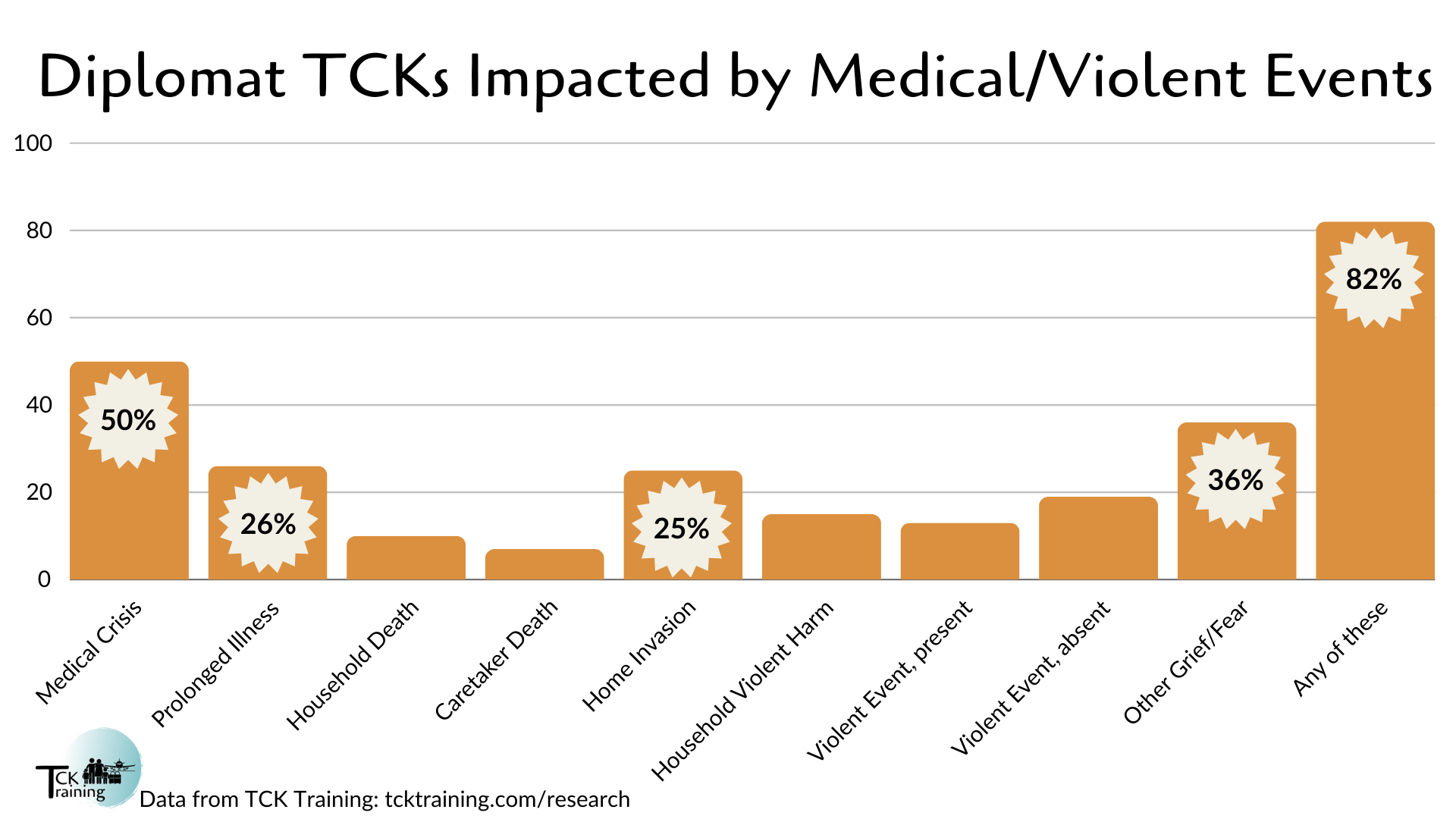
Medical Events
Multiple studies have connected serious medical issues, including chronic illness, with negative impacts on the patient’s family. Importantly, these stressors can impact the family’s long term emotional health. We asked about three categories of medical trauma: (1) medical crisis; (2) prolonged illness; and (3) death.
Diplomat kids experienced the aforementioned types of household medical events at higher rates than other TCKs, except for the missionary sector. (Missionary kids formed a significant proportion of respondents, and tended to have different experiences overall.) Nearly two thirds of diplomat kids experienced a household medical event during their childhood (62%).
Multiple studies have connected serious medical issues, including chronic illness, with negative impacts on the patient’s family. Importantly, these stressors can impact the family’s long term emotional health. We asked about three categories of medical trauma: (1) medical crisis; (2) prolonged illness; and (3) death.
Diplomat kids experienced the aforementioned types of household medical events at higher rates than other TCKs, except for the missionary sector. (Missionary kids formed a significant proportion of respondents, and tended to have different experiences overall.) Nearly two thirds of diplomat kids experienced a household medical event during their childhood (62%).
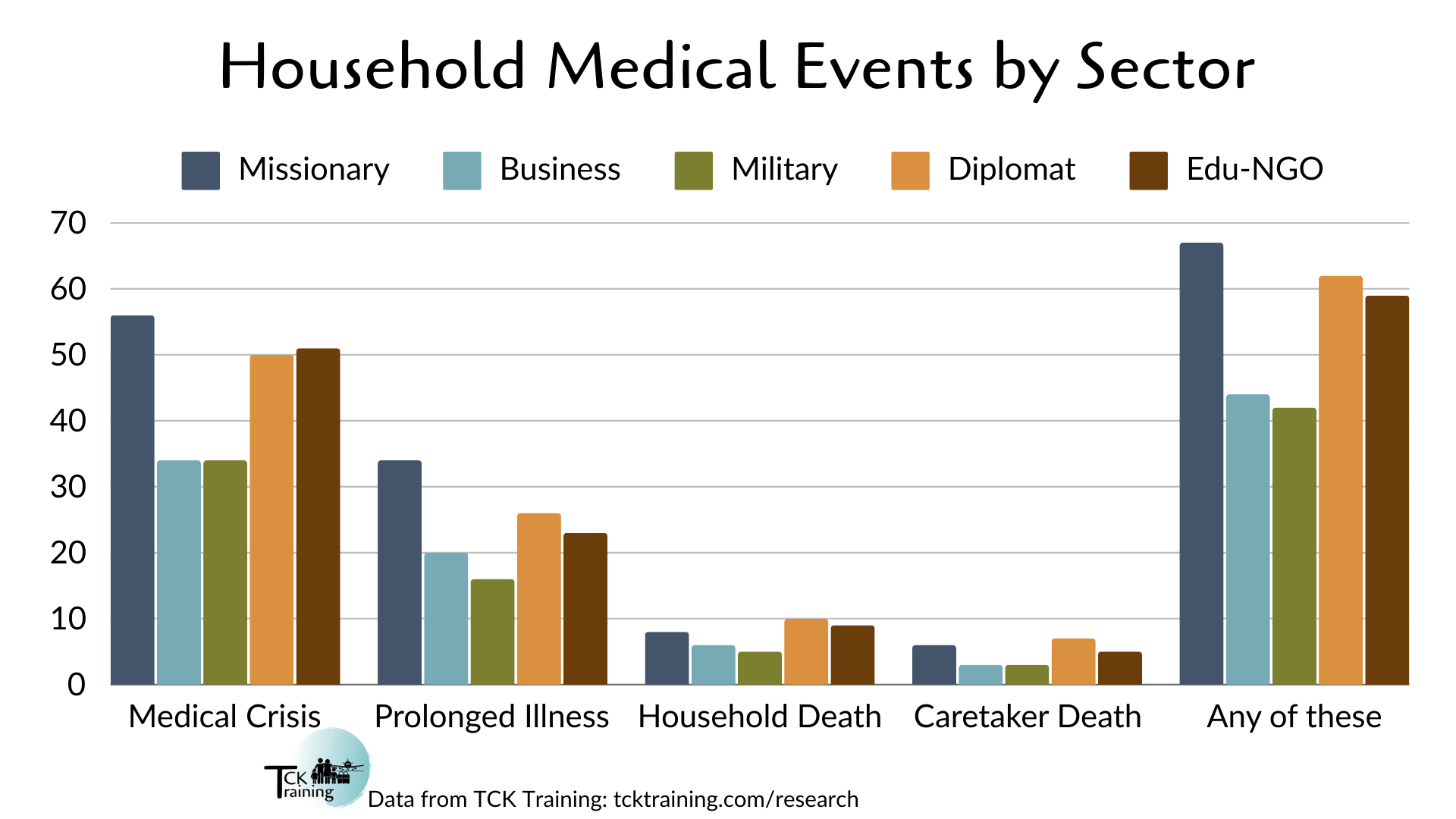
Medical crises affected half of diplomat families (50%). Diplomat kids who reported a household medical crisis were more likely to have a high-risk ACE score than those who reported a household death (40% vs 27%). 1 in 4 diplomat kids (26%) had experience of prolonged illness in their household; 46% had a high-risk ACE score. Medical trauma not only impacts the individual but the family as a whole. TCKs with these experiences were more likely to also report experiencing emotional abuse, emotional neglect, and household adult mental illness.
1 in 10 diplomat kids (10%) reported that a member of their household died while they were a child; 7% reported the death of a non-residential caregiver.
1 in 10 diplomat kids (10%) reported that a member of their household died while they were a child; 7% reported the death of a non-residential caregiver.
Violent Events
When violence is part of a family’s lived experience, it affects each family member. Our research illustrates the increase in Adverse Childhood Experiences like physical abuse, emotional abuse, emotional neglect, and mental illness of parents in the home.
When violence is part of a family’s lived experience, it affects each family member. Our research illustrates the increase in Adverse Childhood Experiences like physical abuse, emotional abuse, emotional neglect, and mental illness of parents in the home.
Often these stresses and struggles are unseen, invisible, hidden behind good jobs, good lifestyles, tropical holidays and other perks others don’t look past.When home doesn’t feel like a safe place, children/young people stay ‘on alert’ without feeling safe to fully relax anywhere in their world. This leads to a state called ‘toxic stress’ which has negative impacts on the brain and body.
Violence can occur in many forms, and exposure to violence at a young age is known to impact development. (More information on this research can be found in the Sources of Trauma white paper). The types of violence asked about included:
- a household member suffering violent harm
- a home invasion/break-in (while the person was home, or while they were away)
- a violent incident occurring at their school while they were present
- a violent incident occurring at another place while they were presenta violent incident occurring in a place they regularly went to while they were not present.
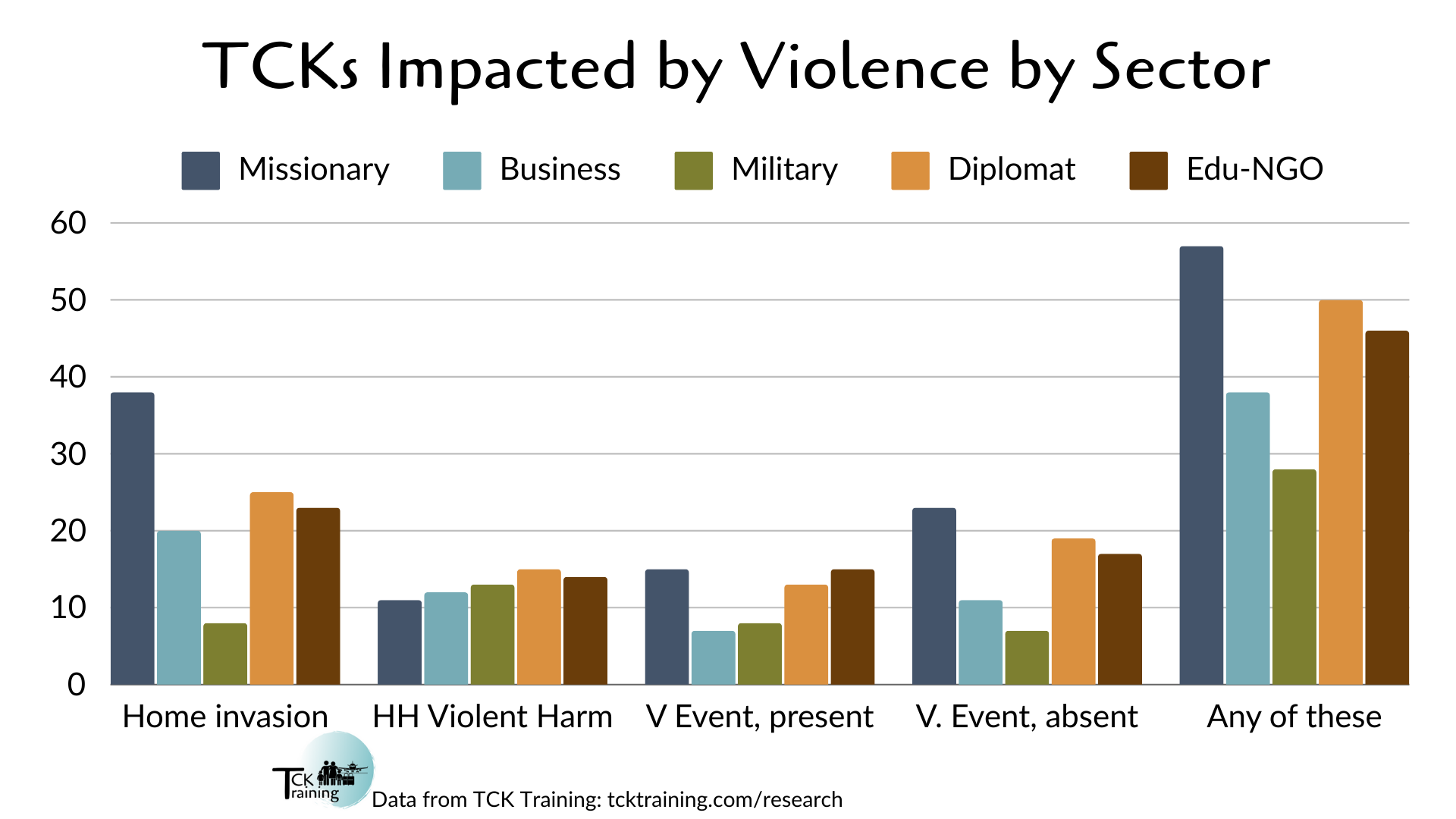
Half of diplomat kids surveyed (50%) reported experiencing one of these violent events in their childhood, compared to one third of non-missionary TCKs (37%). The most common event was a home invasion, experienced by one quarter of diplomat kids (25%). 37% of those diplomat kids had a high-risk ACE score. 1 in 7 diplomat kids (15%) also reported that a member of their household suffered violent harm. Those diplomat kids had a very high likelihood of a high-risk ACE score (63%).
The survey asked TCKs if they had been present during a violent incident (i.e. armed robbery) at their school or somewhere else in their community, or if such an event happened at a place they regularly went while they were not there. Diplomat kids were more likely to report a violent incident occurring in their absence (19%) than when they were present (13%). Both types of incidents had a corresponding increase in ACE scores (30% and 36% respectively).
Overall Impact
‘Small-scale’ events that affect TCKs directly in their homes and communities are not small in impact. They have an effect on ACE scores, and create conditions of stress for TCKs and their families. This emphasizes that trauma occurring at any scale can have a significant impact on well-being.
In addition to the small-scale events already mentioned, almost 4 in 10 diplomat kids (36%) reported additional experiences of intense grief or fear. This also comes with an elevated ACE risk (38% compared to 27%).
‘Small-scale’ events that affect TCKs directly in their homes and communities are not small in impact. They have an effect on ACE scores, and create conditions of stress for TCKs and their families. This emphasizes that trauma occurring at any scale can have a significant impact on well-being.
In addition to the small-scale events already mentioned, almost 4 in 10 diplomat kids (36%) reported additional experiences of intense grief or fear. This also comes with an elevated ACE risk (38% compared to 27%).
The more stress parents are under, the less they have left to give to their children – despite the fact that their children, living under this stress, are in great need of their parents’ support.
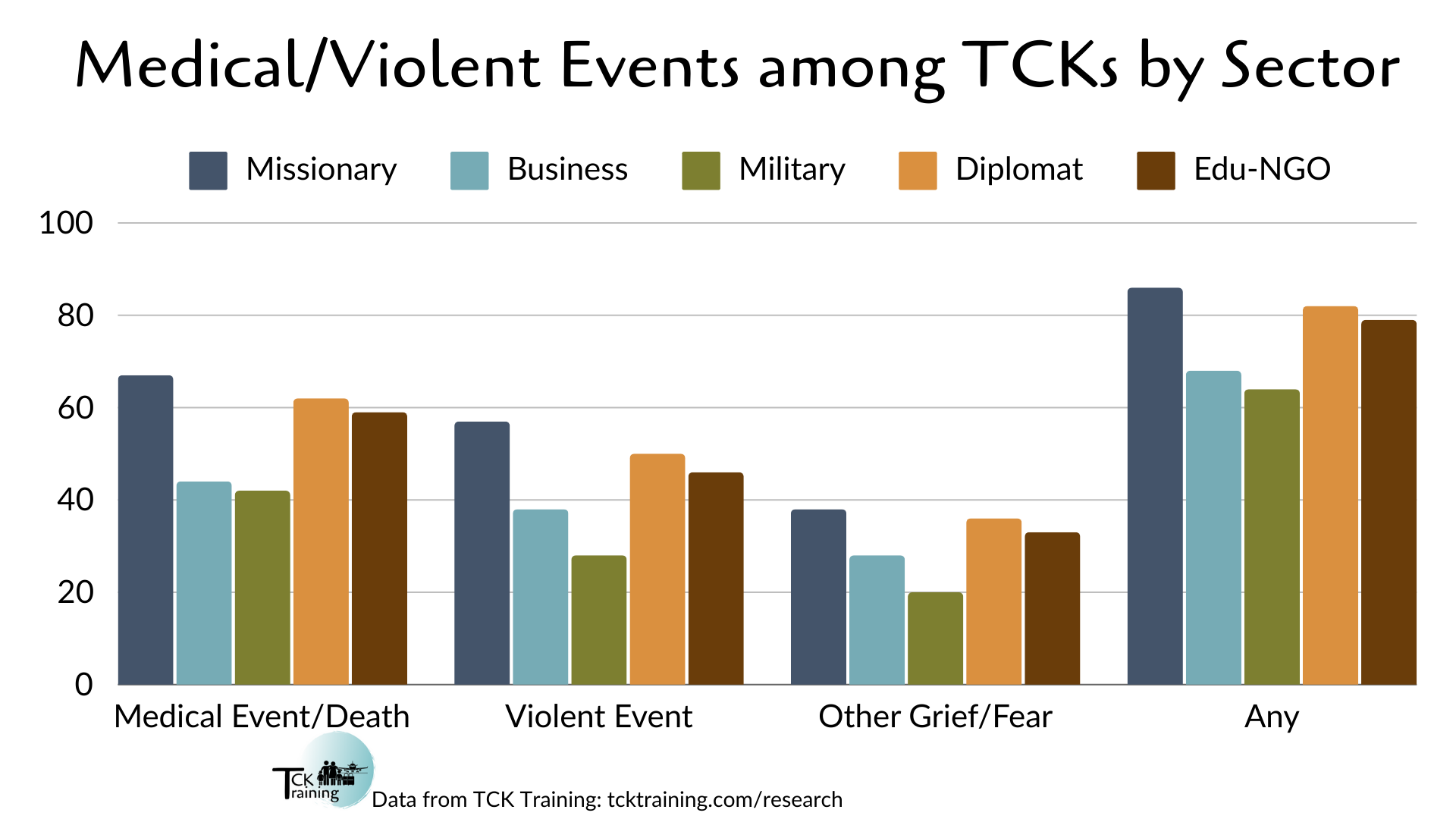
Diplomat kids reported experiences of small-scale traumatic events (medical, violent, and other intense grief/fear) at a higher rate than other non-missionary TCKs. 82% of diplomat kids experienced at least one of these potential sources of trauma.
On the other hand, when diplomat kids reported that they had none of these potentially traumatic experiences, only 5% had a high-risk ACE score (4 or more out of 10). This is less than half the ACE risk seen in the largest survey of ACEs (in the US), and lower than any study worldwide using the same questions.
On the other hand, when diplomat kids reported that they had none of these potentially traumatic experiences, only 5% had a high-risk ACE score (4 or more out of 10). This is less than half the ACE risk seen in the largest survey of ACEs (in the US), and lower than any study worldwide using the same questions.
Large Scale Events

Political Disruption
Over half of diplomat kids experienced a type of political disruption during their time abroad. While TCKs may consider political violence/corruption minor and thus hardly worth mentioning due to their high frequency (and therefore normalization), this environment contributes to a child’s perception of safety and who can be trusted in the world around them. 54% of diplomat kids experienced political disruption.
Over half of diplomat kids experienced a type of political disruption during their time abroad. While TCKs may consider political violence/corruption minor and thus hardly worth mentioning due to their high frequency (and therefore normalization), this environment contributes to a child’s perception of safety and who can be trusted in the world around them. 54% of diplomat kids experienced political disruption.
Events that happen often can easily be normalized, which means it is important to know what is affecting international families in negative ways so we can call them out as stressors that need to be acknowledged and processed.
War/Unrest
Evacuation
Evacuation can occur due to any large-scale event, or even small-scale events such as medical emergencies/illness. 1 in 7 diplomat kids (14%) experienced an evacuation. While this was a small sample, the ACE risk nearly doubled for diplomat kids with this experience (47% compared to 27%).
2 out of every 5 diplomat kids (40%) reported being exposed to war and/or unrest. One third of diplomat kids (33%) exposed to war had high-risk ACE scores. Exposure to war was associated with a small but consistent increase in all types of child maltreatment as well as in mental illness and substance abuse in their household adults.
Natural Disasters
One third of diplomat kids (30%) experienced a natural disaster, such as an earthquake or tsunami. Natural disasters had a larger effect on child maltreatment rates compared to political disruption and war, particularly when it came to emotional abuse and neglect. More than one third of diplomat kids (38%) that reported experiencing a natural disaster had a high-risk ACE score.
Natural Disasters
One third of diplomat kids (30%) experienced a natural disaster, such as an earthquake or tsunami. Natural disasters had a larger effect on child maltreatment rates compared to political disruption and war, particularly when it came to emotional abuse and neglect. More than one third of diplomat kids (38%) that reported experiencing a natural disaster had a high-risk ACE score.
Evacuation
Evacuation can occur due to any large-scale event, or even small-scale events such as medical emergencies/illness. 1 in 7 diplomat kids (14%) experienced an evacuation. While this was a small sample, the ACE risk nearly doubled for diplomat kids with this experience (47% compared to 27%).
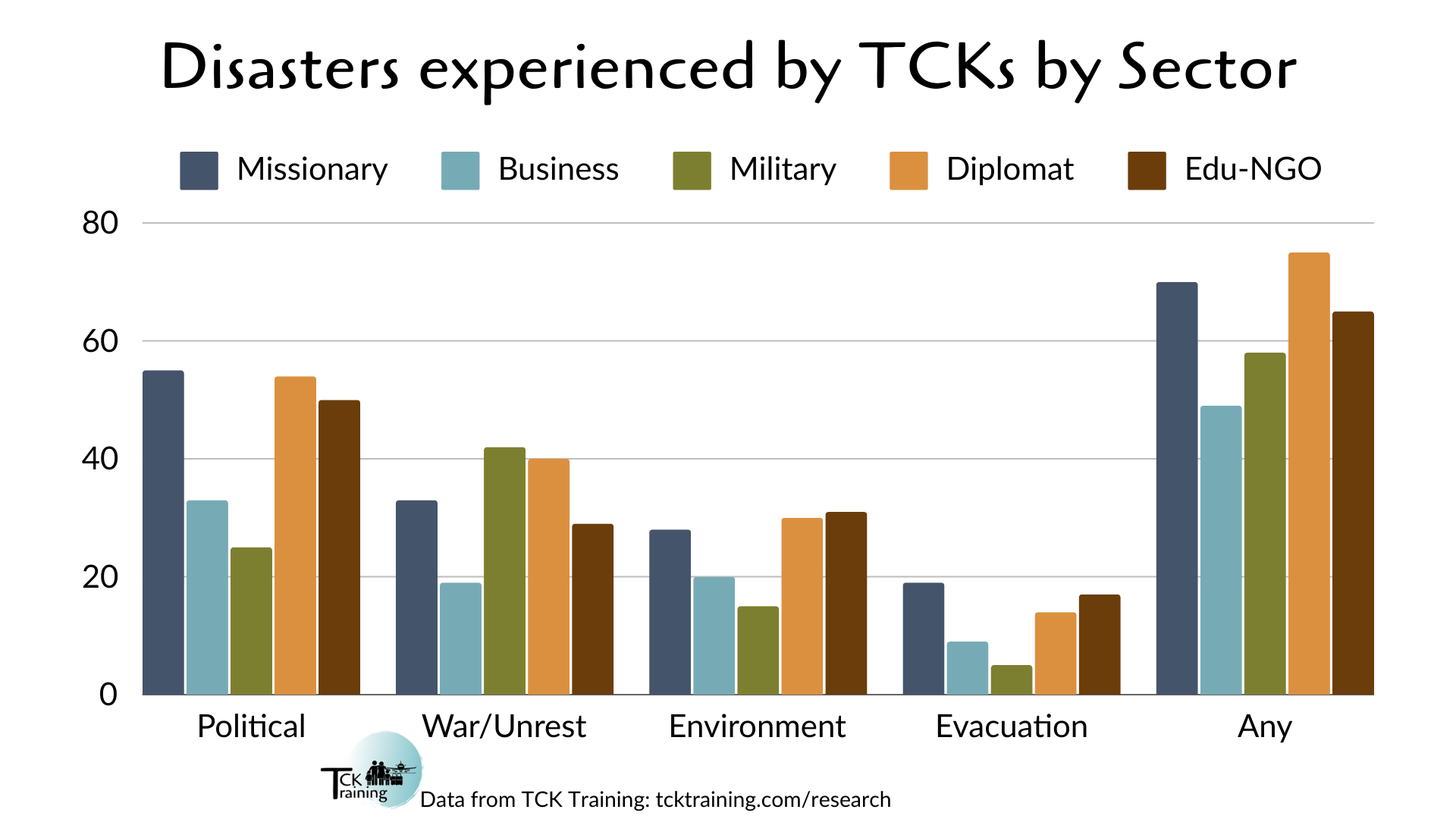
Overall Impact
One quarter of diplomat kids (25%) reported experiencing a large-scale traumatic event. For diplomat kids that did not experience any of these large-scale events, 1 in 5 (22%) had high-risk ACE scores – a small decrease from the overall average of 27%.
One quarter of diplomat kids (25%) reported experiencing a large-scale traumatic event. For diplomat kids that did not experience any of these large-scale events, 1 in 5 (22%) had high-risk ACE scores – a small decrease from the overall average of 27%.
Witnessed Events
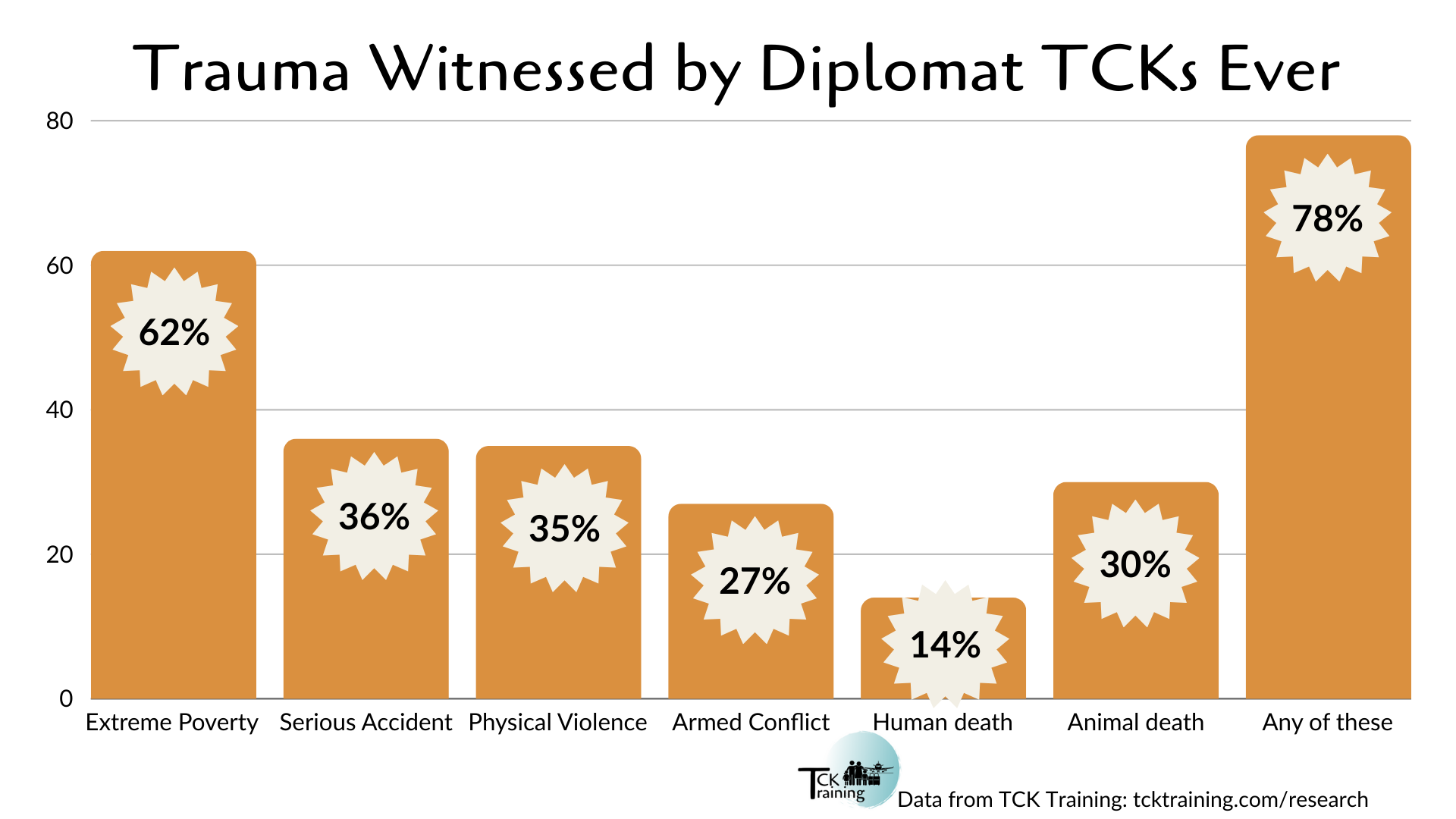
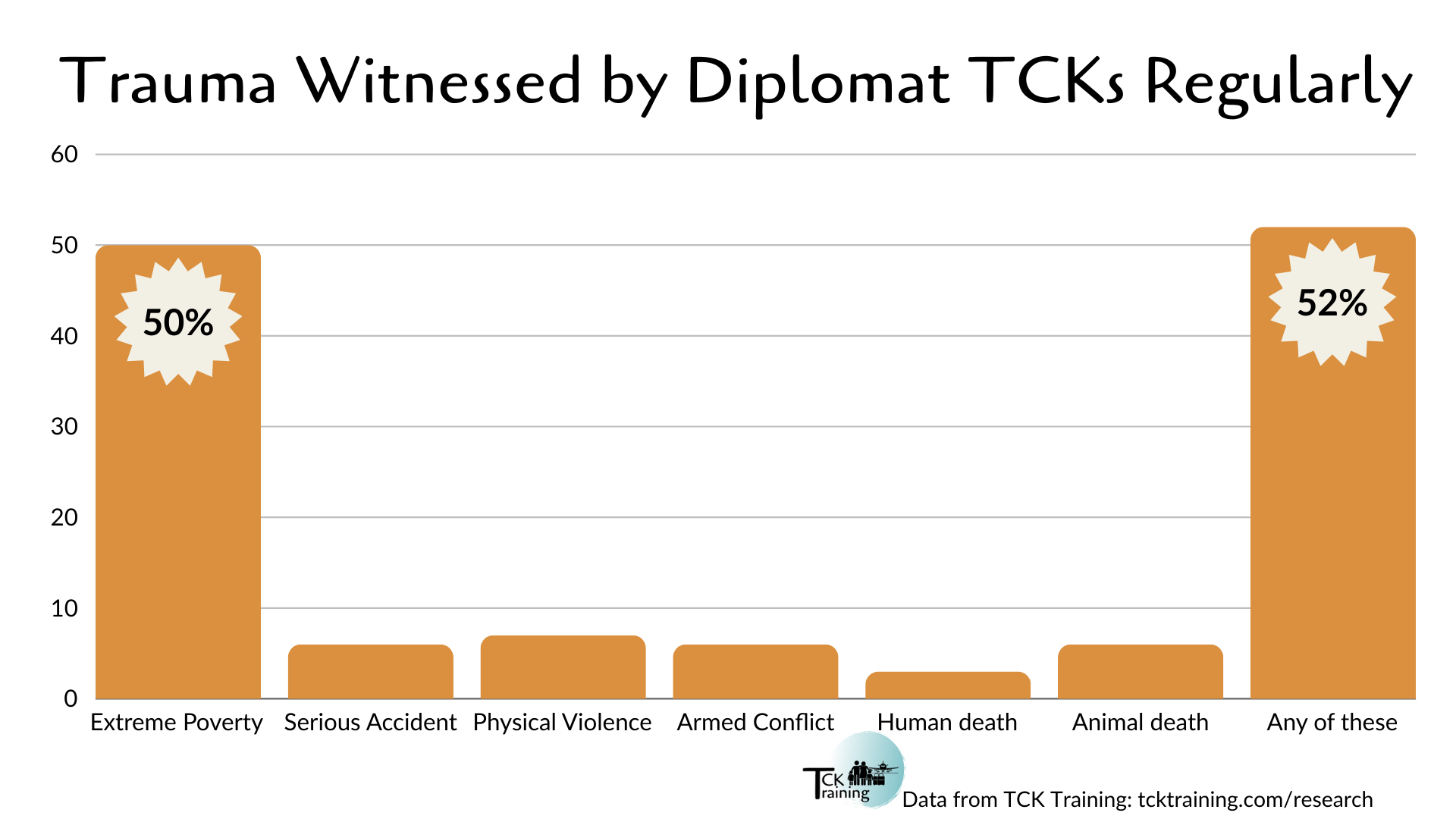
Extreme Poverty
Diplomat kids were more likely than other non-missionary TCKs to be exposed to extreme poverty. 62% of diplomat kids reported they had witnessed extreme poverty at least once, and half (50%) said they witnessed this regularly.
While witnessing poverty was not correlated with increased ACE risk, it is still worth acknowledging. This is a form of 'moral injury', defined by Foreign Policy as "perpetrating, failing to prevent, bearing witness to, or learning about acts that transgress deeply held moral beliefs and expectations". Children who are being taught (often at a well funded international school, or in a very comfortable home) that all people are equal, and to treat others with respect and kindness, may struggle to integrate these messages with their lived reality of witnessing people living in extreme poverty.
Diplomat kids were more likely than other non-missionary TCKs to be exposed to extreme poverty. 62% of diplomat kids reported they had witnessed extreme poverty at least once, and half (50%) said they witnessed this regularly.
While witnessing poverty was not correlated with increased ACE risk, it is still worth acknowledging. This is a form of 'moral injury', defined by Foreign Policy as "perpetrating, failing to prevent, bearing witness to, or learning about acts that transgress deeply held moral beliefs and expectations". Children who are being taught (often at a well funded international school, or in a very comfortable home) that all people are equal, and to treat others with respect and kindness, may struggle to integrate these messages with their lived reality of witnessing people living in extreme poverty.
Serious Traffic Accidents
On the surface, traffic accidents may not seem detrimental. Witnessing any serious traffic accident, however, is likely to cause an adrenal reaction as the body attempts to deal with a stressful situation. We have heard many stories from Adult TCKs who suffered mentally and emotionally from witnessing major injuries and even deaths due to traffic accidents as children. 1 in 3 diplomat kids (36%) had witnessed at least one serious traffic accident, while 6% witnessed them regularly. Witnessing a serious traffic accident was associated with a higher rate of high-risk ACE scores (37%).
On the surface, traffic accidents may not seem detrimental. Witnessing any serious traffic accident, however, is likely to cause an adrenal reaction as the body attempts to deal with a stressful situation. We have heard many stories from Adult TCKs who suffered mentally and emotionally from witnessing major injuries and even deaths due to traffic accidents as children. 1 in 3 diplomat kids (36%) had witnessed at least one serious traffic accident, while 6% witnessed them regularly. Witnessing a serious traffic accident was associated with a higher rate of high-risk ACE scores (37%).
It’s important to understand that witnessing an incident that results in death or a life-changing injury – or even the potential for those things – can also lead to PTSD. A study from the American Academy of Pediatrics also showed that not only were child victims of road incidents at risk, but their parents too – even if they’d not directly been involved in the incident. 25% of the children in the study and 15% of the parents suffered diagnostic PTSD. It’s easy to see why road incidents are thought to be one of the leading causes of PTSD in the general population.
It’s important to understand that witnessing an incident that results in death or a life-changing injury – or even the potential for those things – can also lead to PTSD. A study from the American Academy of Pediatrics also showed that not only were child victims of road incidents at risk, but their parents too – even if they’d not directly been involved in the incident. 25% of the children in the study and 15% of the parents suffered diagnostic PTSD. It’s easy to see why road incidents are thought to be one of the leading causes of PTSD in the general population.
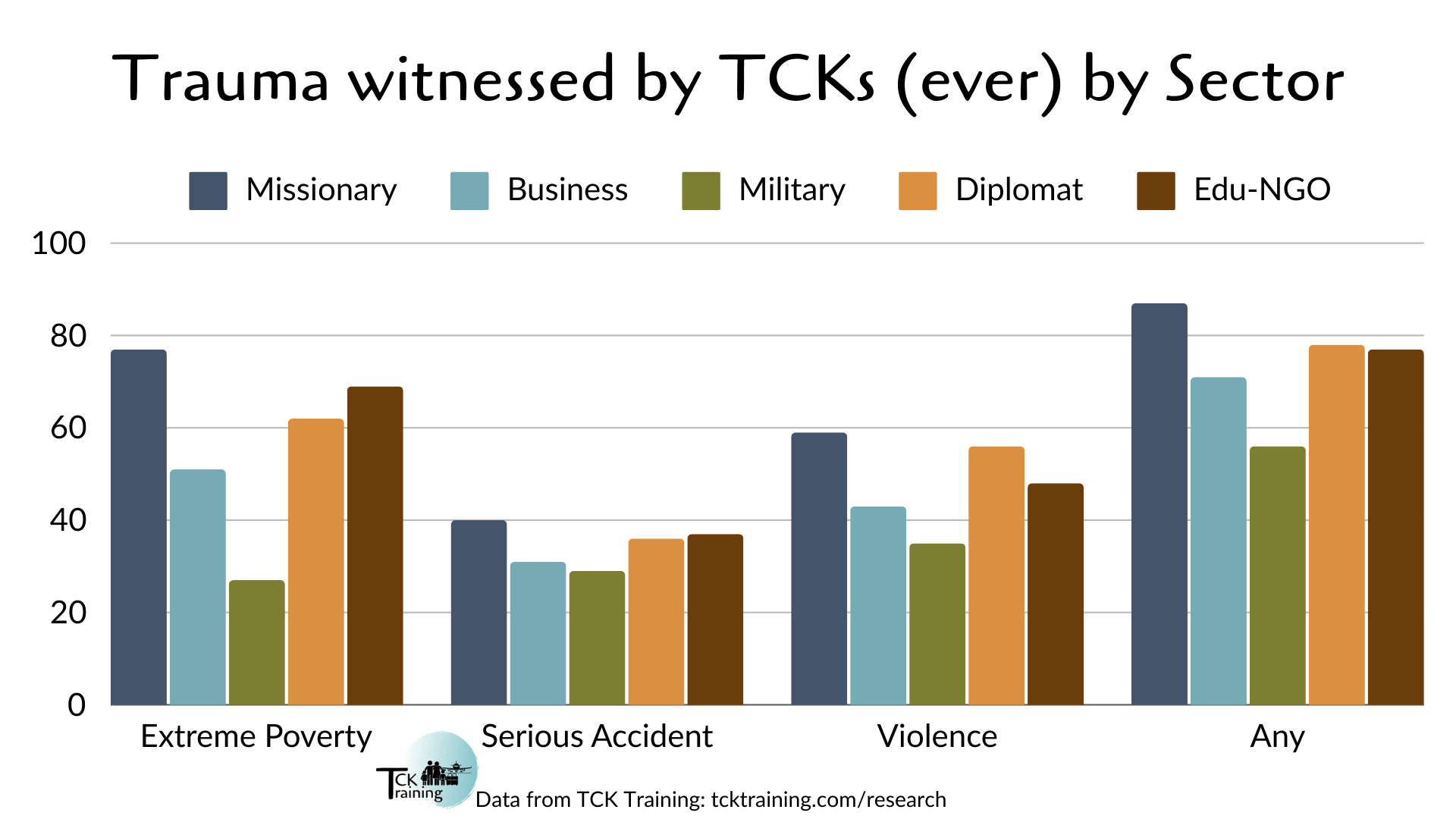
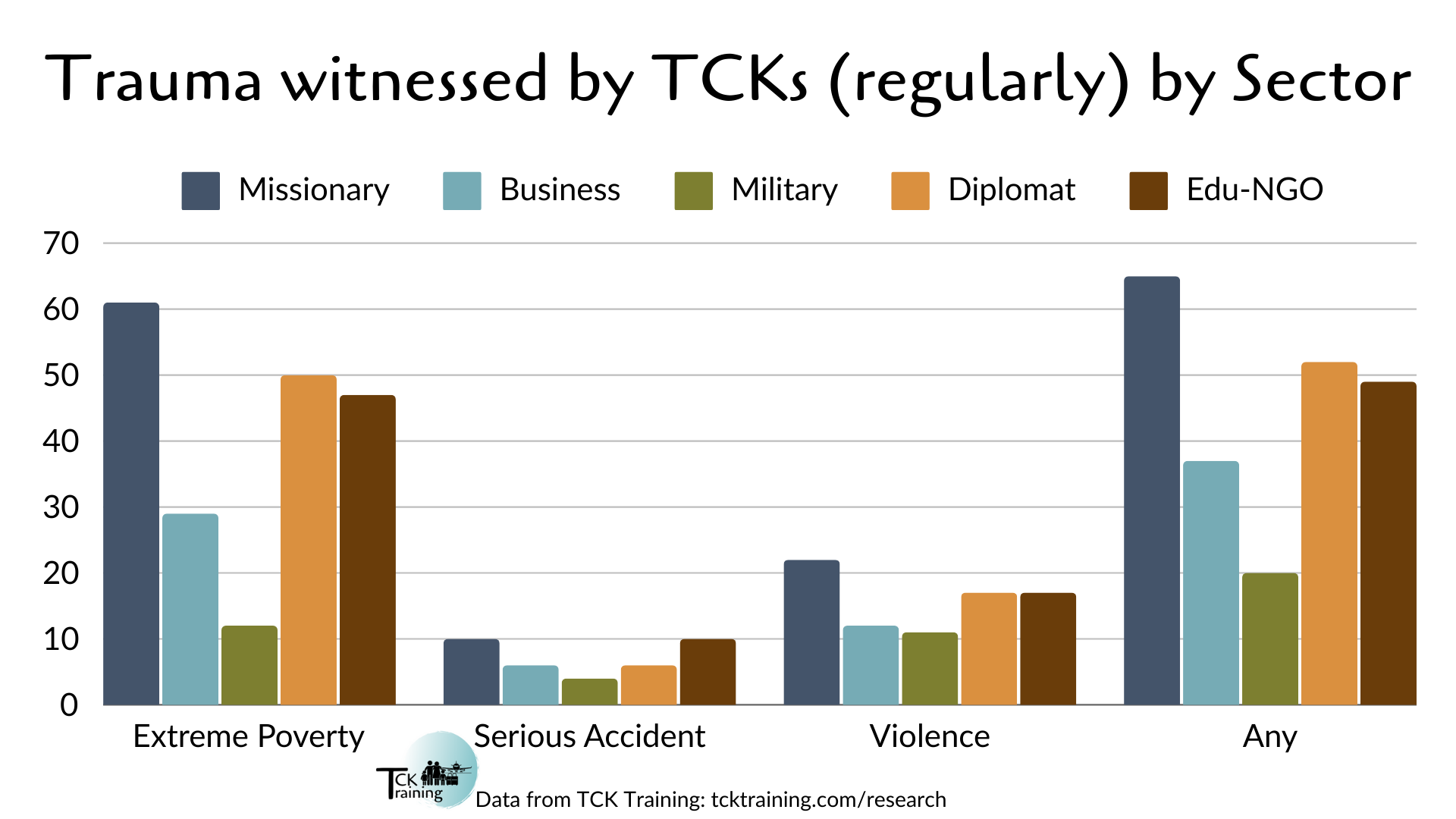
Violence
Witnessed violence combines experiences of armed conflict, human death, animal death, and physical violence. Over half of diplomat kids (56%) had witnessed a violent event, while nearly 1 in 5 (17%) witnessed these events regularly. Exposure to violent events was correlated with double the rate of high-risk ACE scores (44%), with the likelihood increasing with more frequent exposure.
Witnessed violence combines experiences of armed conflict, human death, animal death, and physical violence. Over half of diplomat kids (56%) had witnessed a violent event, while nearly 1 in 5 (17%) witnessed these events regularly. Exposure to violent events was correlated with double the rate of high-risk ACE scores (44%), with the likelihood increasing with more frequent exposure.
More than half of non-missionary TCKs who regularly witnessed armed conflict, traumatic death, or physical violence had a high-risk ACE score.
Physical violence was the most commonly witnessed event: 35% of diplomat kids witnessed at least one incident, and 7% saw these events regularly. Over half of those diplomat kids (54%) had a high-risk ACE score. One quarter of diplomat kids (27%) had witnessed armed conflict, which was also associated with an increased ACE score (34%).
1 in 7 diplomat kids (14%) reported witnessing a traumatic human death at least once, including 7% who witnessed a murder. Regularly witnessing traumatic human death, the case for 3% of diplomat kids increased the likelihood of a high-risk ACE score (35% compared to 27%).
We also asked about witnessing traumatic animal death, as we have worked with many TCK and ATCKs who had experienced this and needed to process it later down the line. Nearly one third of diplomat kids (30%) had witnessed the traumatic death of an animal, with 6% witnessing this regularly. 44% of diplomat kids who witnessed the traumatic death of an animal had a high-risk ACE score.
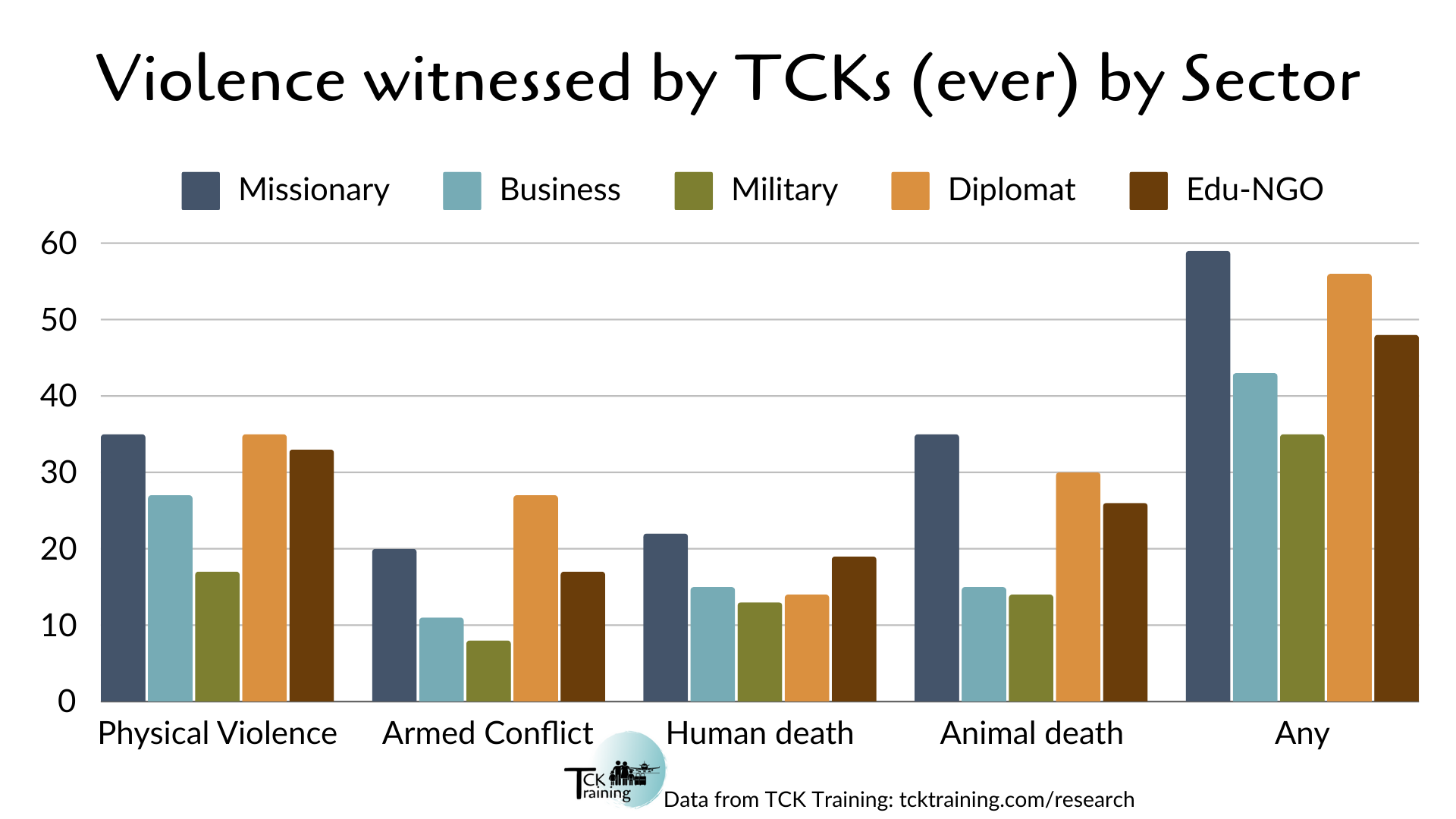
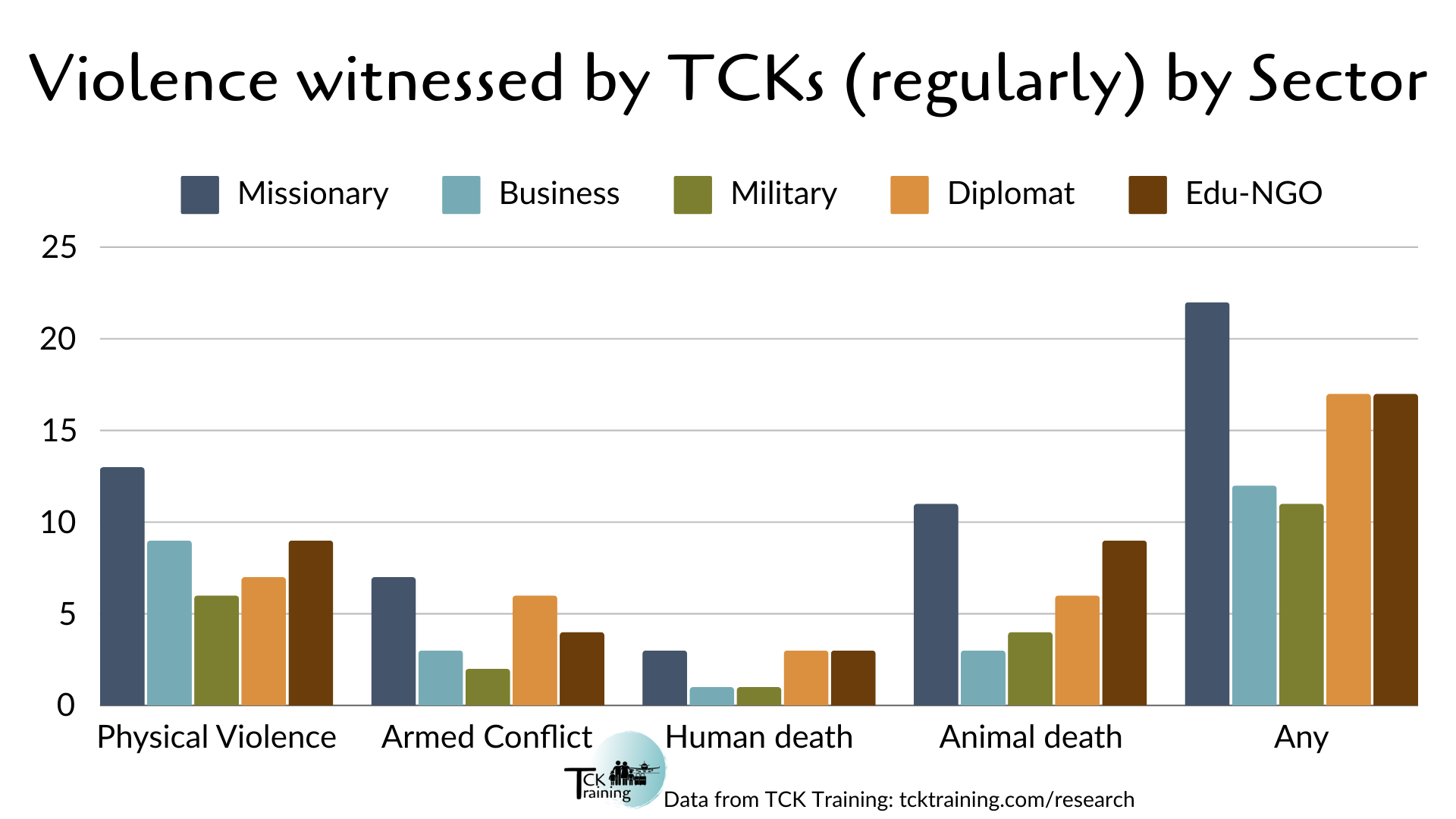
Overall Impact
78% of diplomat kids witnessed at least one of these potentially traumatic events, with over half of diplomat kids (52%) witnessed potentially traumatic events regularly. Diplomat kids who did not witness any of these potentially traumatic events were half as likely to have high-risk ACE scores.
That said, ACE scores are not the only way to measure the impact of potentially traumatic events, and we anticipate that future research will help us learn more.
That said, ACE scores are not the only way to measure the impact of potentially traumatic events, and we anticipate that future research will help us learn more.
Where do we go from here?
This data can feel overwhelming. These numbers are sobering, and it is right and good to take time to reflect on them – and the people these numbers represent. So many children, teens, and families we know have been through these traumas. Some of them have received excellent support and are doing well. Some of them have not, and are not. We can and should grieve the occasions in which trauma was not well addressed.
As we hold the weight of this, we ask the question: where do we go from here?
Potentially traumatic events threaten the mental health and stability of international families. When we recognize them as such, we can mobilize to acknowledge and debrief these events. These events cannot always be predicted; when changes in the environment threaten emotional/physical safety, especially through frequency of potentially traumatic events, the location’s suitability should be reassessed.
As we hold the weight of this, we ask the question: where do we go from here?
Potentially traumatic events threaten the mental health and stability of international families. When we recognize them as such, we can mobilize to acknowledge and debrief these events. These events cannot always be predicted; when changes in the environment threaten emotional/physical safety, especially through frequency of potentially traumatic events, the location’s suitability should be reassessed.
Individuals working in the diplomatic corps and foreign service sector, for any country, are by definition impacted by the vocational expectation of being a representative of an entire country at all times. This expectation is also placed upon their partners and children, especially during the experience of living outside their passport country.
There are resources available to help those who were not helped effectively in the moment. Unstacking Sessions are a great resource to help Adult TCKs work through what happened in their childhoods and how this impacted their internal narratives. Unstacking Your Grief Tower is a short and inexpensive book that helps Adult TCKs work through this process on their own.
More than this, however, we want to see quality preventive care happen.
Departmental Support is essential for diplomats and their families. This may be provided through the HR department, and/or specific family support workers. Budgeting for this support is essential to ensuring foreign service families thrive long term.; Ccommunity organizations are wonderful but cannot on their own bear the burden of providing for all families’ emotional needs.
More than this, however, we want to see quality preventive care happen.
Departmental Support is essential for diplomats and their families. This may be provided through the HR department, and/or specific family support workers. Budgeting for this support is essential to ensuring foreign service families thrive long term.; Ccommunity organizations are wonderful but cannot on their own bear the burden of providing for all families’ emotional needs.
Child protection is essential, and organization-level strategies should be put in place to safeguard children. Families need education to understand not only the rewards but also the risks for international life. When a government sends them abroad, that government also bears responsibility for providing adequate information and effective support. Volunteer family organizations can be wonderful, but they also need institutional backing to provide the best care possible.
A great start for those working in family support is to learn more about TCKs and their needs. Support staff can also be trained to provide excellent care specific to the needs of global mobile families.This might include running a private training in Debrief Certification or Family Check-In Training, or getting certified in TCK care (either as a program leader through Pathways, or on-the-ground care in Groundwork).
Quality pre-departure training for the diplomat’s family is essential. This service need not be offered in-house as there are options to out-source pre-departure training, debriefs, and other invaluable services. Parent Packages are a great way to support families by giving them access to resources that will equip them well.
Quality pre-departure training for the diplomat’s family is essential. This service need not be offered in-house as there are options to out-source pre-departure training, debriefs, and other invaluable services. Parent Packages are a great way to support families by giving them access to resources that will equip them well.
Government employees working abroad, whether as diplomats or in any area of foreign service, deserve effective personal and family support to promote the long-term well-being of their children.
Debriefing is another incredibly powerful tool to help families work through the difficult parts of their journey in a way that also affirms the good things, while equipping parents to have ongoing conversations with their kids. We recommend that family debriefs occur annually, to catch things that aren’t noticed in the moment, with a full debrief every four years. A crisis debrief is a helpful tool when a particularly disruptive or traumatic event occurs. A great book for parents who want to incorporate emotional support into their TCK parenting is Raising Up A Generation of Healthy TCKs, or for a shorter and more debrief-centric reading, The Grief Tower.
Other good resources to assist parents include:
References:
- Caution and Hope: The Prevalence of Adverse Childhood Experiences in Globally Mobile Third Culture Kids (Crossman and Wells, 2022. TCK Training.)
- TCKs at Risk: Risk Factors and Risk Mitigation for Globally Mobile Families (Crossman, Wells and Vahey Smith, 2022. TCK Training.)
- Sources of Trauma in International Childhoods: Providing Individualized Support to Increase Positive Outcomes for Higher Risk Families (Crossman, Vahey Smith, Wells and McCall, 2023. TCK Training.)
- 2021 Survey
- Dressed for Press: unseen struggles of diplomat families (Crossman, The Lonely Diplomat, 2023)
- Causes of PTSD: Road Traffic Incidents (PTSD UK, retrieved 2024)
- Mitigating Risk Factors for Diplomat Kids (McCall and Crossman, 2023, TCK Training)
Empty space, drag to resize
Related blog posts:
About the Author
Tanya Crossman grew up in Australia and the US before moving to China at age 21; she has worked with TCKs for 20 years. She is the Director of Research and International Education at TCK Training.
Sahana Kanabar's parents are from two different continents, met in a third, and raised their children in a series of countries while working as educators in international schools. Sahana was a research intern at TCK Training previously, and now works with TCKs at an international school in China.



